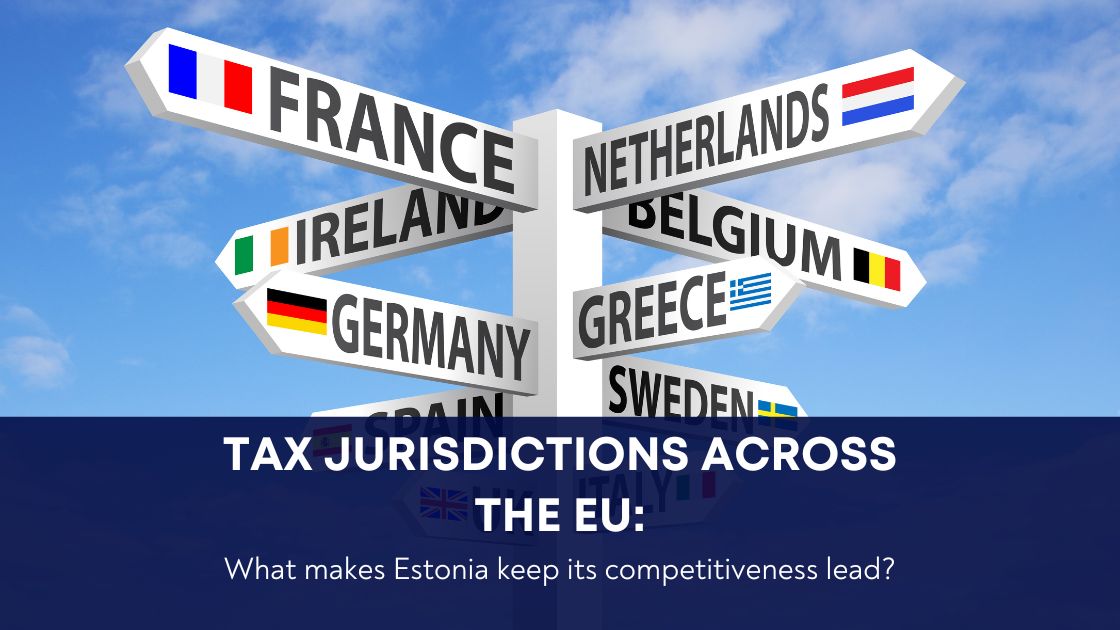Tax jurisdictions across the EU: what makes Estonia keep its competitiveness lead?

In October 2024, the International Tax Competitiveness Index reconfirmed the primacy of Estonia’s tax jurisdiction: Estonia ranked #1 for the 11th year in a row. Multiple factors contribute to making this system unique and appealing for new businesses.
The attention on Estonia’s business-friendly policy is gaining increasing recognition; “the Silicon Valley of Europe”, “the startup nation”, “land of unicorns”, are just some of the titles used to describe Estonia’s unique benefits for local and foreign entrepreneurs.
This article compares the tax systems of eight European Union countries: Estonia, Latvia, Lithuania, Poland, Spain, France, Italy, and Germany. The following analysis serves as a guide to examine how different tax regulations might benefit or hinder the growth of your future company. The following questions are addressed: where should you register your business? From an Estonian perspective, what are Estonia’s biggest strengths? What makes it the ideal place to register your start-up?
No tax until distribution – Corporate Income Tax in Estonia and across Europe
The European average CIT rate is 21.5%, with lower rates in Eastern European countries – namely Lithuania (16%) and Poland (19%). Despite the seeming low competitiveness offered by its 22% CIT rate, Estonia stands out for its remarkable policy on undistributed profits: Estonian CIT is paid exclusively on distributed profits, dropping tax pressure on all saved and reinvested earnings. The absence of taxes on retained profits represents a major attractive feature for entrepreneurs from all over the world.
The Estonian CIT rate is applied using a unique mechanism: 22/78 of the net amount distributed. For example, if a company has a profit of €10,000 that shareholders wish to distribute, the entire €10,000 is treated as the gross amount. From this, CIT of €2,200 is paid, leaving €7,800 as net dividends for shareholders. This system is unique and to the present date has only been replicated by Latvia, which, however, imposes a higher CIT on dividends (25%).
Plug and play: Value-Added Tax registration in Estonia
Estonia is often credited internationally for its advanced digital services; e-residency likely being the most important one. VAT registration is a key example of the rapidity and simplicity of Estonian e-governance.
VAT standard rates in the EU:
Estonia’s standard VAT is remarkably close to the European average with a 24% rate, similar to Lithuania and Latvia (21%), and Poland (23%). Many Western European countries offer similar rates: Spain, France, Italy, and Germany require standard VAT rates ranging from 19% to 22%. Despite the Estonian VAT being raised to 24% in July 2025, the fast and simple bureaucracy remains a key factor to be considered in addition to the rates.
The duration of VAT registration procedures might redirect your attention towards Estonia, especially if you are a digital nomad. Countries such as Italy and Germany offer a VAT registration process that can last several months for foreigners – for instance, 3 months is the average waiting time for a German VAT application to be processed. The required paperwork includes steps that need to be completed in person by fiscal representatives or local accountants.
Bureaucracy differs across Eastern Europe, where the Baltic countries offer faster and more digitalised solutions for e-residents. Latvia and Lithuania offer the possibility to register fully online in a timeline ranging from 2 to 4 weeks. Estonia does not fall behind compared to the other Baltics; on the contrary, VAT registration in Estonia can take as little as 1 to 5 business days for e-residents, making it the fastest and most straightforward possibility among the EU – a real plug and play mechanism.
Simple and competitive: Personal Income Tax
European OECD countries have an average statutory top PIT rate of 42,8%, with a predominance of progressive tax systems: Italy ranges from 23% to 53%, Germany and France from 0% to 45%, and Spain from 19% to 30%. PIT is more competitive in Poland (12%/30%), Latvia (25,5%/33%), and Lithuania (20%/32%), with statutory top PIT rates ranking significantly below average. The Estonian system is characterised by a low, simple and competitive flat tax of 22%. Additionally, there is a tax-free allowance for incomes up to 654 euros per month and non-residents are taxed only on their Estonian income.
Comparison of tax jurisdictions:
| Country | CIT (Corporate Income Tax) | VAT (Value Added Tax) | PIT (Personal Income Tax) | CGT (Capital Gains Tax) | Social Tax | Land Tax | Property Tax |
|---|---|---|---|---|---|---|---|
| Lithuania | 16% | 21% | 20–32% | 15–20% | 13.97–21.76% | 0.01–4% | 0.5–3% |
| Latvia | 25% | 21% | 25.5–33% | 25.5% | 33.69% | 0.2–3% | 1.5% |
| Poland | 19% | 23% | 12–32% | 19% | 33.19–35.85% | — | Estimated yearly |
| Estonia | 22%* *Only on distributed profits |
24% | 22% (flat) | Via PIT | 33% | 0.1–1% | — |
| Spain | 25% | 21% | 19–30% | 19–27% (5% exemption) |
36.95% | — | 0.4–1.1% |
| France | 25% | 20% | 0–45% | 30% | 45% | — | 0.5–1.5% |
| Italy | 24% | 22% | 23–43% | 26% | 40% | — | 0.4–1.06% |
| Germany |
15.825% + trade tax (8.75–20.3%) |
19% | 0–45% | 26.375% (5% exemption) |
40% | — | Local tax |
Your top registration choice
Estonian tax jurisdiction keeps its competitiveness primacy due to its simplicity, velocity, and business-oriented perspective. It is no coincidence that startups flourish in the Estonian economy, supported by a favourable tax system and an efficient and advanced digital infrastructure. Estonia could be the ideal choice for you to launch your startup as a digital nomad: registering your company here will open the doors to unique tax benefits for you.
Ready to benefit from Estonia’s unbeatable tax advantages and digital-first infrastructure?
Our team at Silva Hunt specializes in helping e-residents and founders register, launch, and grow their companies in Estonia. Reach out to us — and let’s build your business the smart way.
FAQs:
What makes Estonia’s corporate income tax system unique?
Estonia taxes only distributed profits. If profits are retained and reinvested, no CIT is due — providing startups with a cash flow advantage.
How fast is VAT registration in Estonia?
VAT registration for e-residents can be completed in as little as 1 to 5 business days, making it the fastest among EU countries.




 Schedule a call
Schedule a call
 Send a message
Send a message